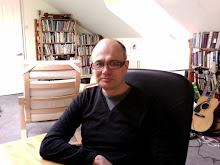
This photograph is a very precious photograph for me.
The three women are religious sisters – nuns, if you like – who, for one reason or another found that there was no room for them in the church to which they belonged. Maria, Carmen and, on the right, Marie Isabel. On our first visit to El Salvador, when the civil war and persecution of the church was still going on, we stayed with them in their Pequeña Comunidad – Little Community in the hope that the presence of a few foreigners might offer them some protection from the infamous Death Squads.
This photograph was taken in their little, open air chapel where each day we gathered together to pray. I particularly remember this evening, which was Carmen’s, in the middle’s birthday. We read from the Bible, sang a hymn to the accompaniment of Carmen’s terrible guitar playing, and shared a celebratory Flan – a disgusting gateau made mostly of confectioners creams, and covered in tinned peaches. All the while, in the darkness, we could hear the rattle of machine guns firing on the nearby volcano.
It was one of the most joyful evenings of my life. One which I will never forget.
***
But, to my shame, I must confess that I had forgotten the name of the young man whose photograph hangs just below that of Monseñor Romero on the wall behind their beautiful log altar. I wasted much of last Thursday ploughing through my records to try to find a reference to him in one of my old sermons. And there, in a sermon from ten years ago, it was.
Miguel Portillo.
***
Below Miguel is Ignatio Martín Baró, one of the six Jesuit theologians murdered at the University in San Salvador in 1989 along with their housekeeper and her sixteen year old daughter. Their photographs appear next if we move clockwise around the wall. At the top is Silvia Ariola. Silvia had been a member of this little community and was one of the 612 members of her church who were murdered or disappeared by the death squads.
And right in the centre is the face of the former Archbishop of San Salvador, Monseñor Oscar Romero.
Romero had been a conservative, academic-minded priest whose appointment initially dismayed the more radical sections of the church in El Salvador. But just days after Romero was appointed, another priest and friend of Romero’s, Rutilio Grande was murdered together with two of his parishioners as they travelled to Mass. Romero travelled to say mass on the spot where Grande was murdered, and began to hear firsthand the stories of unbelievable hardship and oppression from the villagers. And in spite of the many threats to his life and the stubborn refusal of the Salvadorean government to act, Romero began to speak out and demand first investigations into the stories he heard, and, as those demands were ignored, he began to call for justice for the poor and oppressed.
Famously, on 23 March, 1980 Romero addressed his Sunday sermon directly to the conscripts and recruits of the Salvadorean military who were conducting so much of the repression:
“…before any human order to kill, God’s law must prevail which says, “Thou shalt not kill!” No soldier is obliged to obey an order which goes against the law of God. No one has to obey an immoral law. It is high time you recovered your consciences and obeyed your consciences rather than the orders of sin. The church, the defender of the rights of God, of the law of God, of human dignity, of the person, cannot remain silent before such and abomination…In the name of God, in the name of this suffering people whose cries rise to heaven more loudly each day, I beg you, I order you in the name of God: Stop the repression!”
The Voice of the Voiceless.
The next day, thirty years ago this week, that voice was silenced by a single bullet fired from the open door of the chapel of the cancer hospital where Romero chose to live instead of occupying the Archbishop’s palace. Romero had just finished the sermon and was about to commemorate the shedding of Christ’s blood when his own blood was spilled.
The Voice of the Voiceless.
Fifty more, nameless, voiceless victims were murdered when troops opened fire on Romero’s funeral. Their blood mixed with the blood of the estimated 75,000 other nameless victims of El Salvador’s bloody, US and UK funded civil war.
***
Which is why it was so important for me to remember the name of Miguel Portillo. Miguel was a student at the Baptist college in El Salvador who, in the face of the ongoing bloodshed, abandoned his studies and went to join the guerrilla army.
For his pains, he was disowned by many within his own church and his own family. And when he was killed, just weeks before we visited, he became just another nameless, voiceless victim .
***
Thirty years on, in remembering Archbishop Romero, the Voice of the Voiceless, we remember Miguel Portillo. In remembering Miguel, we remember 75,000 other nameless victims. And in remembering the victims of El Salvador, we remember the victims of Chechnya, of Srebrenica, of Rwanda, of Northern Ireland, of Zimbabwe.
And in remembering the victims of human sin, we remember the one in whose name we meet together.
“We have never preached violence,
except the violence of love,
which left Christ nailed to a cross,
the violence that we must each do to ourselves
to overcome our selfishness
and such cruel inequalities among us.
The violence we preach is not the violence of the sword,
the violence of hatred.
It is the violence of love, of community, the violence that wills to beat weapons
into sickles for work.”
Oscar Romero 27 November, 1977







No comments:
Post a Comment